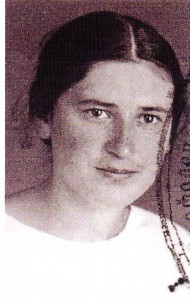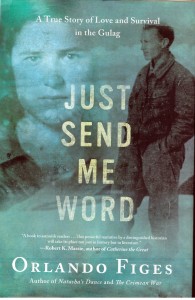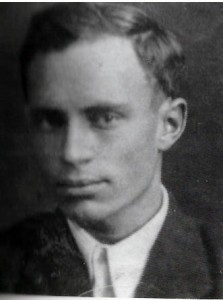
 To comprehend this book about the relationship of two young Russian people who lived at that pre-war, war-time and post-war time, different in many ways, it is necessary to try to immerse at that time at least for a while, which myself I was a witness too but just a child.
To comprehend this book about the relationship of two young Russian people who lived at that pre-war, war-time and post-war time, different in many ways, it is necessary to try to immerse at that time at least for a while, which myself I was a witness too but just a child.
Svetlana Ivanova was born to the relatively well-off family, Lev Mishchenko had no immediate family of his own: his parents Valentina and Gleb, teachers by profession, died when Lev was little.
Both Sveta and Lev met in Moscow where they both studied at the Physics Faculty of the Moscow University. She graduated from the University, he did not. War divided them. Lev ended up in Gulag, she struggled in Moscow without him.
Among many an admirer of hers Svetlana picked up him as Lev Mishchenko was one of a kind, highly intelligent, a person of principles and morals, very romantic. His letters from Pechora Wood Combine where he was imprisoned for ten years, are full of beautiful descriptions of his feelings for her, weather conditions, atmosphere and relations to the other people. Just this letter of January 4, 1951 shows Lev’s extraordinary talent for writing:
“My darling Sveta, the New Year has started as a continuation of the old. We spent New Year’s Eve quietly and modestly in the barrack, where thanks to Lyosha Anisimov there was a bushy Christmas tree, which was decorated fairly respectably by a collective effort… I still haven’t sent you the letter from yesterday but once again I’m drawn towards paper – for no particular reason, just to find a place to write your name: there’s no room left for it inside my head, where I’ve been repeating it incessantly in every intonation and in every permissable and impermissable grammatical form… I’ve tried to busy myself more with work so as not to think so much about Your Ladyship, and I’ve managed fairly well – so there yo
The author of the book is right stating at the end: “The book really belongs to the Mishchenkos”. It is their story and without their help it could not have been written. Lev Glebovich and Svetlana Aleksandrovna were very supportive from the start of this project.” I imagine how Lev Mishchenko could write his own story! Orlando Figes in his particular manner gives the full portrait of economical achievements of labor camp production, opening of Volgo-Don Canal, Belomor Canal and other Great Construction Projects of Communism.
It leads to the strange conclusion that who could work at such extreme conditions with such extreme efficiency if not those who are forced to. By census of early 1950’s Gulag population was 2,561,351 prisoners, a million  more than in 1945. But at what cost of human lives destroyed, families torn up and innocent people who died and their families did not know and do not know now where they were and why.
more than in 1945. But at what cost of human lives destroyed, families torn up and innocent people who died and their families did not know and do not know now where they were and why.
Strange as it may seem the Soviet people, Sveta and Lev not excluding, did not like and do not like now to talk about politics.
They do not judge superiors. They simply live day by day and silently carry their destinies.
Lev survived his Gulag experience because of the good people who helped him. As in an usual outside world there are good people and there are bad people. Beware of bad ones! They can bite as dogs and kill as predators. In Gulag was the same.
Sveta wrote to him:
Page 211 reads:
“My darling Lev, I received your letter of 1-3 November yesterday. Levi, I didn’t manage to express myself correctly and I don’t even now know the best way to say what I mean – only God forbid that I should want somebody (or something) to vanquish me inside you. When I wrote about victory, I meant our victory. Not victory over us but victory over everything cruel that we’ve had to face, over the burdens that have made us stumble and caused us pain. I don’t want the pain to make you forget even for a moment all the good in the world – the earth and the sun and the water and, most importantly, people and relationships. I don’t want this joy to subside, and I want us to be young for a long time. Reasoning – any reasoning – doesn’t come to it. Levi, if the world is lit up already, then I hope it stays as bright, despite the laws of physics and regardless of the distance from the source of light. And in reality there is no distance, since the source is your attitude towards others, which means it’s always w i t h i n y o u…Nevertheless, I’m right about not counting on just one person,Levi. Life should be taken on so firmly that not even the greatest sorrow can change this attitude, as long as it’s not a small-minded attitude from below, but a wise, almost Tolstoyan, attitude from above. In that case it’s far from the destruction of what’s human; on the contrary, it’s what makes us human. I’m frustrated that I can’t express myself better; you might as well tear this letter up. I fell compassion for someone who loses his zest for life on impact with it ( maybe love as well as compassion), but I have the greatest respect for those who remain on their feet (if they do so not out of flippant bravado, but through willpower, intelligence and character)… I come across more bravely in company than I truly am, but I try keep going and I think that’s how it should be. Oh, give up; I can’t do it. I wanted to write a nice, humorous, cheerful letter and tell you that YOUR LETTER WAS LIKE A SONG TO MY EARS , but instead of that I’ve got angry with myself almost to the point of tears for my inarticulate mumblings. Well, what’s there to say about the weather? Only that it’s horrible.”
Watch the picture gallery:
no images were found
The two intellectuals’ correspondence helped both of them, Lev and Svetlana, to withstand hardships in life and later in 1955 they registered their marriage, raised up two children, three grandchildren and he died in 2008 at age of 91, she – in 2010. They lived together for more than 40 years, exactly as my parents did.
 They passed to their children the wisdom to follow the two main principles in life:
They passed to their children the wisdom to follow the two main principles in life:
1) never feel sorry for yourself;
2) wherever you may find yourself if only temporarily, you should always try to live as if it’s permanent.”
And enjoy every day of your life, that’s what we can add to it, as Lev did:
Page 228 reads:
“Svetlaya, my darling, I haven’t sent you my congratulations for the 8th of March, though nobody deserves the honor more than you. Actually, modesty probably holds you back from acknowledging that any special reverence is due on this occasion. I, on the other hand, am completely unhindered in the regard and without fear of admonishment can confess how very glad I am that the female sex exists on this earth. I’m full of the highest respect for you all, higher than my respect for mankind in general. It’s difficult to put this feeling into words if one lacks the talent since it inevitably ends up sounding like empty rhetoric, but I would like to try nonetheless, even after Nekrasov. Because in my life, from  early childhood on, the good people to whom I owe the most have been women. I’m still tortured by the awareness that I will never be able to repay not only those who took care of me without any thought for themselves,
early childhood on, the good people to whom I owe the most have been women. I’m still tortured by the awareness that I will never be able to repay not only those who took care of me without any thought for themselves, like my grandmother, but also those who served as models of humanity, combining kindness with fortitude in all life’s trials, quiet wisdom with lively humor in their perception of reality, tirelessness at work with a constancy of affection.
like my grandmother, but also those who served as models of humanity, combining kindness with fortitude in all life’s trials, quiet wisdom with lively humor in their perception of reality, tirelessness at work with a constancy of affection.
There have been so many women in my life whose qualities I admire that no number of negative examples, either observed at first hand or reported, could change my views. It’s true that for every good person in the world there are several bad ones, but there is so much that is wonderful in that person that it makes up for all the bad in the others. I can’t think of those women – my grandmother Lidiya Konstantinovna, her sister Aunt Liza, Elizaveta Alexandrovna,uncle Nikita’s wife, Aunt Lilya, and many others without the most profound reverence. How much sadness Lidiya Konstantinovna endured, how many misfortunes that could have crushed her and destroyed her spiritual strength. How much fortitude she must have summoned to avoid succumbing to despair, to remain magnanimous and spiritually pure while keeping a clear head and continuing to support those without the strength to withstand such difficulties on their own. How many women there are like that! Women like my grandmother. And how much darkness there would be in the world if they did not exist! Sveta, do I really need to tell you that I see in you the qualities of all the finest women I have ever known. My darling, dear Sveta.”
Listen to the music:The Most Beautiful Music in the World
 Such true live stories as Lev and Svetlana’s I heard once in St. Petersburg where I traveled with the special purpose to meet my daughter who was at her 1st year of studies at the Leningrad University. I arrived early at thecity and made up my mind to walk around the area. The weather was not for walks and I started to look for ads at the nearest movie theatres. Instead, I saw a modest advertisement in hand writing with the invitation to the meeting with the people-survivors from the Gulags. Start at 6-00 p.m.
Such true live stories as Lev and Svetlana’s I heard once in St. Petersburg where I traveled with the special purpose to meet my daughter who was at her 1st year of studies at the Leningrad University. I arrived early at thecity and made up my mind to walk around the area. The weather was not for walks and I started to look for ads at the nearest movie theatres. Instead, I saw a modest advertisement in hand writing with the invitation to the meeting with the people-survivors from the Gulags. Start at 6-00 p.m.
I had read before “Archipelago Gulag” by A. Solzhenitsyn and knew something about that period of time of Soviet History.
So, I entered the entrance. All the walls were covered with white craft papers of 3×2 feet where there were hand written the full names of the prisoners of the Soviet Gulags, with the exact name of their labor camps. I was circling around and around, catching their names, tried to count them. The task was impossible: there were thousands of them and still more were left to read.
I looked around: the big crowd gathered, more adults, I did not see children anywhere. Then all were invited to the bigger hall, a capacity of perhaps, of 800 people. In some while the auditorium was packed. The people started to take the floor telling their true stories of survival in gulags. One by one, standing in line on stairs, waiting for their turns to speak about what happened to each of them in short, how many years to be imprisoned, what they did in the camps, when they were released, how difficult to find a job after. 
 In front of my eyes there were passing the ruined lives of the regular people like myself…
In front of my eyes there were passing the ruined lives of the regular people like myself…
The meeting went on and on. It was already a late hour after midnight but nobody hurried home. Neither did I. I was fascinated by those people. their stern faces, true eyes and movements.
On the early morning when I showed up facing my daughter, she asked me:
“Where have you been, Mom, for the whole night? I was expecting you every moment after your call.”
“I’ve been at the meeting with the Gulag people.” I answered.
“Where? At the meeting?!” she astonished.
“Yes.”, I repeated firmly. “And I liked it so much.”
“O’kay. Everything is clear with you now.” she said.
With the respect to the wonderful people from Gulags, who survived terrible conditions of labor camps, and remained the pure Russian souls to take as a model for future generations, we prepared the photo flowers dedicated to them.